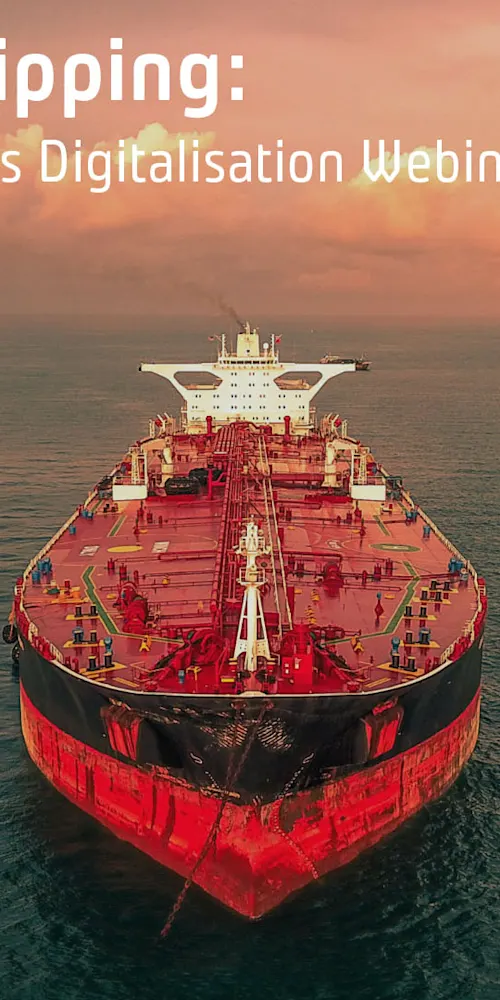The Future of Shipping: ZeroNorth on Lloyd’s List’s Digitalisation Webinar
Joining the shipping journal’s recent webinar, CEO, Søren Meyer discussed the growing urgency of digitalisation, and why creating immediate impact hinges on the right mindset.

Shipping is facing three key challenges in the coming years; the constant push for profitability, the need to address its impact on the climate, and the constant market volatility that owners and operators must overcome. For ZeroNorth, we believe that digitalisation is a critical part of the solution to these challenges.
In a recent webinar on the future of shipping and digitalisation, CEO, Søren Meyer discussed how digitalisation and the wealth of data at shipping’s fingertips is being increasingly recognised as a driver of genuine business change — but only under the right proviso.
The Lloyd’s List webinar, moderated by editor, Richard Meade, was the first in a series on the future of shipping and maritime as the industry continues to source new forms of energy and clean technologies that drive sustainability. Read on to find out more.
Commercial collaboration is tantamount
Digital solutions help to create transparency. We believe that shipping must be collaborative to accelerate digital impact; building partnerships and technologies that connects charterers, owners, operators and suppliers, working together to utilise data as the foundation to reduce emissions and increase revenues. Indeed, ZeroNorth was founded with this exact goal in mind. Yet what’s key, according to Meyer, is how the industry approaches this right now.
“In the short term, we need to remember the commercial side of the business because that’s where the advances are coming from,” said Meyer, speaking on the Lloyd’s List webinar. “If the proposition can’t translate into some value for the business, you won’t see transformation. There has to be a tangible commercial angle.”
Søren Meyer was joined by panellists including Ioannis Martinos, head of Signal Group, Pierre Guillemin VP for technology at Wärtsilä Voyage, and Sven Brooks, Senior Director of IoT Business Development for KVH. And the point on collaboration — and ensuring it’s mutually beneficial — was one reiterated by all.
Read more: Data into Actions: Driving Change in an Era of Influence
A flexible approach to data
This distinction on value-led partnerships wasn’t the only point of emphasis from Meyer during the webinar. He noted that while data and data-led solutions offer intrinsic capabilities in the short- and long-term for the industry, data fragmentation is a recognised par for the course.
“Instead of imposing our standards on customers, we ask them to send what data they have […] and we have to be ready to work with any kind of data.”
ZeroNorth’s proprietary technology Optimise interprets multiple data points from across the fleet to provide insight into vessel performance and determine the optimal speed of each vessel. Without the need for any hardware installation, Optimise interprets data from a vessel including noon reports and fuel consumption, in combination with each customer’s view of their potential market. It also makes use of third-party information such as weather data, AIS positions and bunker prices to create its recommendations on optimal operating speeds and ETAs for a vessel’s destination. In Optimise, all voyage legs are recorded, logged and quantified, which makes it possible for users to follow both CO2 emissions as well as the US dollar upside to their operations over time.
The use of Optimise across the global fleet has significantly accelerated since ZeroNorth launched in 2020. Now, over 1,600 vessels are committed to using the solution to enhance performance, increase TCE earnings and reduce CO2 emissions.
Read more: Data, Blue Economies, and the Future of Ocean Sustainability
Decarbonising shipping is central to the industry’s future — and to ZeroNorth’s vision. The available data on the market can already generate actions on emissions reduction if it is used to power market-leading algorithms and software such as ZeroNorth’s Optimise.
Moreover, it’s something that can be achieved right now; by using the power of digital technologies, owners and operators can immediately act on their emissions output whilst also increasing revenue.
If you’d like to watch the webinar in full, you can do so on demand here.